jazz scales and what chords to play them over
Wondering how to play jazz scales? We're going to show you everything you lot need to know most jazz scales.
In this complimentary guitar lesson y'all volition learn:
- half-dozen essential jazz scales that will brand you sound amazing.
- seven quick & like shooting fish in a barrel secrets that volition help y'all principal jazz scales.
- 2 jazz hacks which volition turn yous into a jazz main.
- 6 must-know jazz licks which will take your playing to the next level.
Over 200,000 guitar-learners get our world-class guitar tips & tutorials sent direct to their inbox: Click here to join them
What is a jazz scale?
A scale is a grouping of musical notes which work together. Scales are used to create melodies and solos.
A jazz scale is simply a scale that can be used over a piece of jazz music. Jazz scales often get compared to the 'blues' scale. The 'blues' calibration is a specific scale which is used in blues music.
Many guitarists make the mistake of thinking that there is a defended 'jazz scale' which they can used over any kind of jazz progression.
Yet, jazz is a picayune more complicated than blues music. Then in reality, to learn jazz scales you have to learn more than than one calibration.
Just similar whatsoever blazon of calibration, jazz scales fall into two categories: major and minor.
Let'due south learn to play some jazz scales.

Major Jazz Scales
There are And then many different jazz scales out there. However, we're going to acquire 2 of the most mutual major jazz scales.
These are:
- The ionian scale aka the major scale.
- The lydian scale.
Any of these scales tin can be used over a major chord, or major chord progression.
If yous'd like to know more nearly musical keys, become here: Learn Guitar Scales In 8 Piece of cake Steps
For all of these examples we're going to keep them in the key of C. That means that you lot could use them over a C major chord, or a progression in the key of C.
Major Jazz Scales – The Ionian Scale
The Ionian scale, aka the major scale is one of the near commonly used scales in jazz music.
This scale has been used endless by some of the greats. It'south a great betoken to start if you lot're new to jazz.
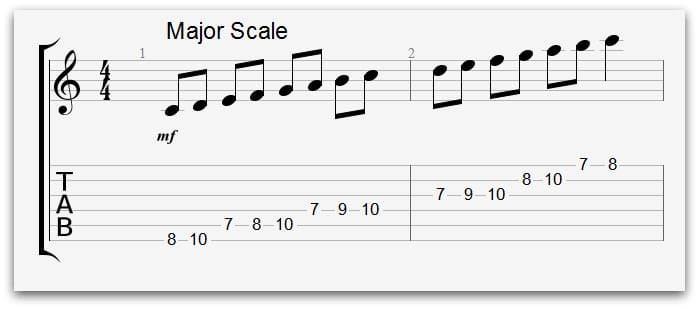
The ionian style is made up of the following intervals:
- Root.
- Major second.
- Major third.
- Perfect fourth.
- Perfect fifth.
- Major 6th.
- Major seventh.
Major Jazz Scales – The Lydian Scale
The lydian manner is very similar to the ionian calibration. Just 1 note is different.
The 4th note in this calibration is sharpened, this gives the calibration an eastern feel. Information technology'south a fantastic alternative to the major calibration, as it has a unique colour and sound.
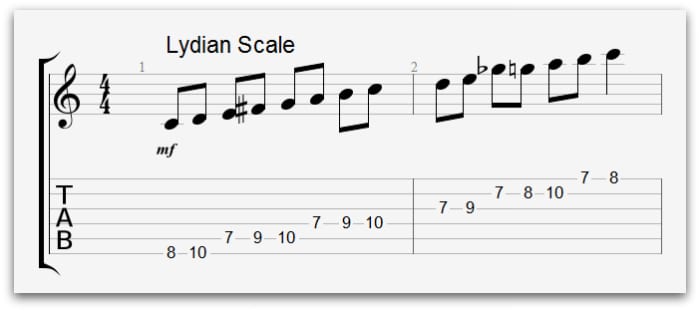
The lydian scale is fabricated up of the following intervals:
- Root.
- Major 2nd.
- Major third.
- Sharpened fourth
- Perfect fifth.
- Major sixth.
- Major 7th.
Tin can yous run into how the fourth note in the scale is sharpened, rather than kept natural? This is what gives the lydian scale such a cool audio.
Dominant Jazz Scales – The Mixolydian Calibration
Another chord type which is normally used in jazz music is the dominant chord, also known as the '7' chord. Ofttimes y'all see these chords used in a 12 bar blues.
Want to learn blues guitar? Go here: Blues Guitar Lessons For Beginners – 4 Ways To Sound Awesome Chop-chop
Jazz is considered a more advanced version of the blues. So having this scale downwardly is essential if you want to get that jazz blues sound into your playing.
Here's the tab and notation, we're nonetheless in the key of C for this one! Then you could utilise this scale over a C7 chord, or a C blues.
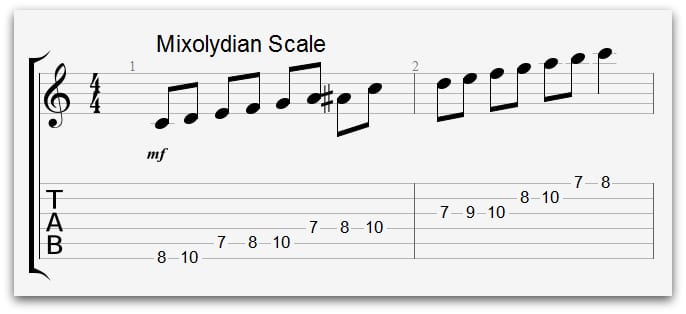
The mixolydian scale is very closely related to the major scale, there is just one interval different. That interval is the 7th. Here are the intervals for the mixolydian scale:
- Root.
- Major second.
- Major 3rd.
- Perfect 4th.
- Perfect fifth.
- Major sixth.
- Flattened seventh.
In the major scale, we have a major seventh.
In the mixolydian scale, we have a flattened seventh. This is what gives the mixolydian scale its bluesy sound.
Pocket-size Jazz Scales
The three most common jazz scales are:
- The dorian scale.
- The aeolian scale.
- The harmonic minor scale.
All of these examples can be used over a Cm chord or anything in the fundamental of Cm.
Modest Jazz Scales – The Dorian Calibration
This scale is one of the most commonly used minor scales. Latin and jazz great, Carlos Santana has been known to use this scale in his playing.
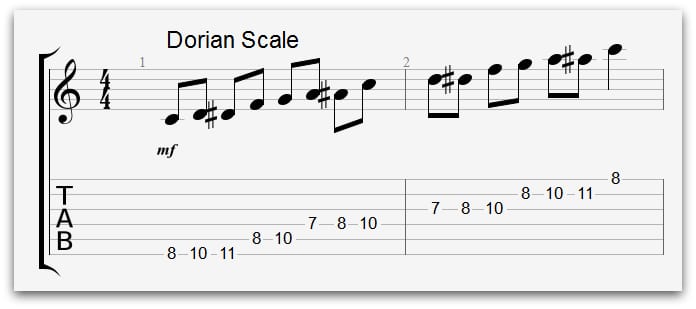
The dorian scale consists of the post-obit intervals:
- Root.
- Major second.
- Minor third.
- Perfect fourth.
- Perfect fifth.
- Major 6th.
- Pocket-size seventh.
Small Jazz Scales – The Aeolian Scale
The aeolian scale aka the 'natural pocket-size' scale is another common calibration which is used past musicians. This scale is perfect if you desire to create a night mysterious sound.
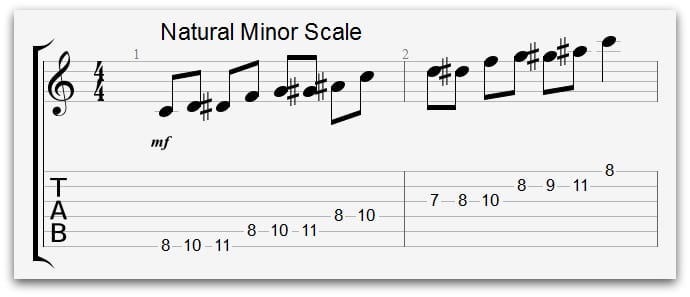
The aeolian calibration is made upwards of these intervals:
- Root.
- Major 2nd.
- Pocket-sized tertiary.
- Perfect quaternary.
- Perfect fifth.
- Modest sixth.
- Minor seventh.
This is very similar to the dorian scale, still this time we have a small-scale 6th note, rather than a major 6th note.
Pocket-sized Jazz Scales – The Harmonic Pocket-size Scale
This scale adds a not bad latin/spanish feel to your guitar solos. If you fancy spicing up your solos, learn this scale!
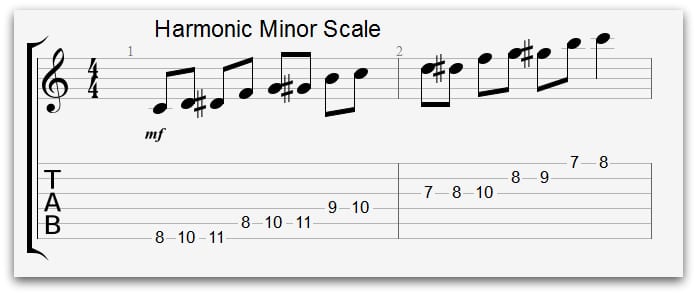
- Root.
- Major second.
- Minor third.
- Perfect fourth.
- Perfect fifth.
- Minor sixth
- Major seventh
Notice how the seventh note has inverse, at present we have a major 7th instead of a minor seventh. This interval gives the scale its spanish audio.
Looking to buy a jazz guitar? Check out this article from Dawsons, which will evidence you ALL of the best jazz guitars: Five Best Jazz Guitars | Dawsons Music
Download our lead guitar cheat-sheet to make things easier
Information technology can exist disorientating for guitarists to understand which scales work with which keys.
With this in mind, we created a cheat-sheet; a cardinal and scale-finder that you can use once more and again.
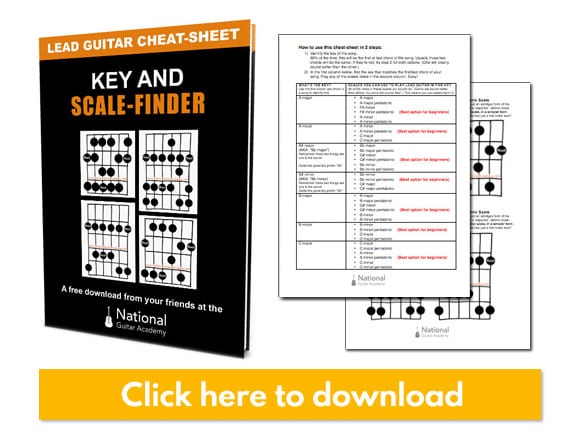
Playing Jazz Scales In Other Keys
You lot don't have to play these scales in C. Y'all can play them in other keys likewise.
If yous're a guitar player, information technology'southward equally uncomplicated every bit changing your root annotation on the low E string.
For case, to play a calibration in the key of A, you'd only start on the fifth fret of the depression E string (6th string) instead.
Or if you wanted to play whatever of these scales in the key of Eb, you'd motility your scale shapes to the 11th fret.
Hither's a list of all of the notes on the depression E string, endeavour and play the following scales in all 12 keys:

- The major scale.
- The lydian scale.
- The ascendant 7 calibration.
- The dorian scale.
- The aeolian calibration.
- The harmonic minor scale.
To learn more virtually scales go here: Learn Guitar Scales In 8 Easy Steps
If you don't play guitar, it's a petty trickier!
To work out what the scales are in other keys.
- You need to retrieve about the interval relations in a calibration.
For example, if you were playing a major scale, the intervals are:
- Root.
- Major 2d.
- Major 3rd.
- Perfect fourth.
- Perfect fifth.
- Major sixth.
- Major seventh.
This formula works for ALL major scales, all you have to do is change the root note, so you can play the scale in whatever key.
The catchy thing here is thinking about what the other intervals in the scale are in relation to the root notation.
This does work for other scales, you just take to exist aware what the intervals are in each calibration.
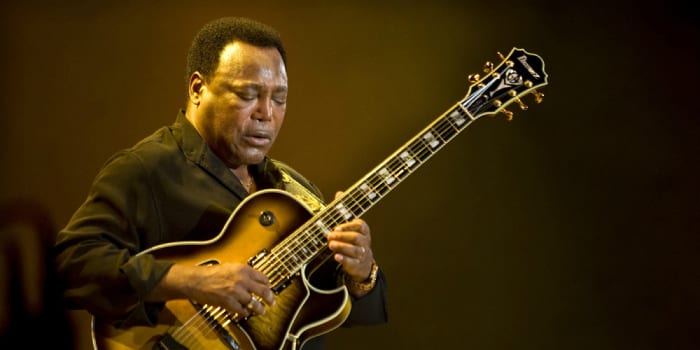
Why Do I Demand To Know Jazz Scales?
Jazz scales are incredibly useful to know for many reasons. The main reason that yous should learn jazz scales is to:
- Become a improve improviser.
- Raise your theory knowledge.
Jazz Improvisation
Almost ALL jazz music contains improvisation. Information technology's impossible to improvise without knowing jazz scales.
Jazz Theory
Some other reason why you need to know is jazz scales is to help with your theory. Jazz can be a quite a dense subject when it comes to theory. Notwithstanding, scales tin be fun and practical.
If yous can acquire more about scales, they will help your theory knowledge. This Volition make you lot a ameliorate jazz musician.
Continue reading on folio ii:
Page 1 Page 2
Source: https://nationalguitaracademy.com/jazz-scales/
0 Response to "jazz scales and what chords to play them over"
Post a Comment